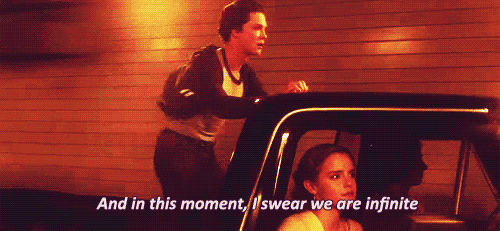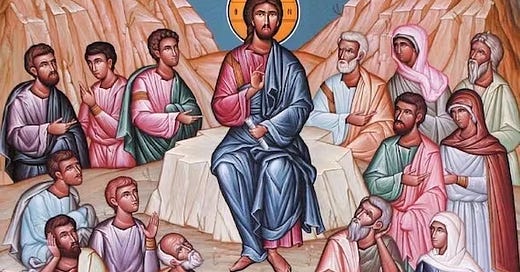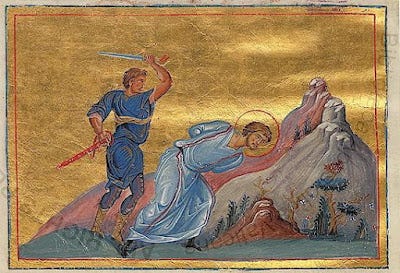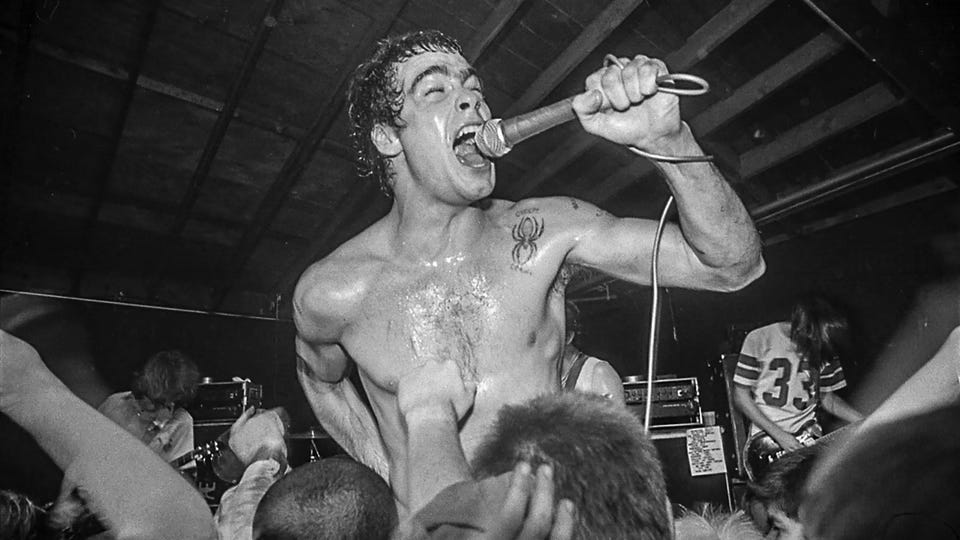There are few stories so illumined with God’s Grace as the story of St. Porphyrius. An actor, Porphyrius was hired to perform for Julian the Apostate on the emperor’s birthday. As his name suggests, Julian the Apostate was a former Christian and the final pagan emperor of the Roman Empire. Throughout his short reign, he made many attempts to suppress Christianity in order to revive the pre-Christian, neoplatonic paganism of the Empire. So, it is fitting that the act St. Porphyrius’ was hired to perform revolved around the ridicule of Christianity. During said act, St. Porphyrius was supposed to mock the sacrament of Baptism. Yet, upon his self-immersion three-fold, in the name of the Father, and of the Son, and of the Holy Spirit, Porphyrius rose out of the water professing himself a Christian. At first, Julian and the crowd thought that this was a part of the act, but they soon realized that Porphyrius was no longer acting. He came out of the water having been acted upon by the Grace of the All Holy Trinity. Refusing to reject Christ, St. Porphyrius was ordered by the emperor to be tortured and eventually the Saint was martyred.
Since becoming an Orthodox Christian, I have often been struck by stories such as these. The stories of the saints are so full of these strange occurrences: St. Christopher carrying the Christ Child through the river, St. Anthony’s battles with demons, The angel bringing St. Onuphrius and the desert dwellers the Eucharist. All of these stories contain great mysteries where God’s Grace bridges worlds through fantastic occurrences. What strikes me about the story of St. Porphyrius, however, is the fact that he wasn’t searching for anything. St. Christopher was searching for the most powerful master, Sts. Anthony and Onuphrius were in the desert searching for God, but not only was St. Porphyrius not searching for anything, he was actively mocking God. Every time I read his life I am awestruck by this fact and I wonder to myself, “What am I supposed to do with this?”
I often look back at my own life and the ways that I mocked God, if not directly, indirectly, through a nihilistic bent in my late teens and early twenties.
I grew up in a very religious household. If I have ever met a saint, surely my mother is one. We went to church every Sunday, prayed before every meal, and spiritual conversations were an almost daily occurrence. Despite this upbringing, I turned my back on Christianity in high school. I woke up one day and my faith was nowhere to be found. Of course, though, losing my faith wasn’t that simple, it never is.
Growing up, I had low self-esteem. The source of this, I’m not quite so sure. I could blame different people and circumstances, and I could probably make some compelling arguments as to why these people and circumstances “ruined” me as a person. However, the more I think about it, the more it seems apparent to me that, despite the ways I have been wronged or hurt, the blaming of other people and circumstances has never been truly satisfying. I could write one thousand different reasons why I lost my faith. I could blame the church I grew up in. I could blame certain family members or adults from my childhood, but really it all just boils down to one thing: pain. I grew up in a lot of pain. This pain wasn’t physical, I had a relatively great childhood on that front. I experienced a lot of mental anguish as a kid.
And that’s how most of my life has gone up to this point. I don’t want to project anything on you, dear reader, but that’s how most of our lives go. It hurts and we try to figure out how to make it work in spite of that. I know that, personally, I have a tendency to make some rash decisions regarding my response to the tougher things in life. That’s how I lost my faith.
I was hurting and confused. I always felt like I was leading a double life regarding my schooling and my churching. At school we learned one thing and at church we would learn something that directly contradicted that. I accepted the teachings of both because I was taught to believe my teachers and to believe my pastor. I never put much thought into the fact that I believed many directly contradictory things until I got older and by then I was too worried about my own soul to ask any questions. So, I just let myself feel guilty for saying the things that would get me good grades in school or let me be seen as a normal person to my peers. In order to appear normal, I got used to masking my fundamentalist beliefs by simply ignoring them. It was in ignoring this dissonance between my worldly and spiritual beliefs that the line connecting them snapped. I had to save one or the other and I chose my worldly beliefs because they directly impacted my educational and social life. Church was only one day out of the week after all.
So, I began following the world in every way that I could. I adopted a materialistic, scientistic worldview. The world became the sum of the events that happened around me physically. The universe was reduced to pieces of matter just bouncing into each other indefinitely. Existence was completely stripped of meaning.
Punk rock also became important in my understanding of the world. It wasn’t just the raw anger and D.I.Y. aesthetics that drew me into punk, but the ethos of bands like Black Flag and Fugazi were what really appealed to me. Those bands, particularly singers Henry Rollins and Ian Mackaye, embodied this total rejection of everything that they saw was wrong with the world. Reading Rollins’ book “Get in the Van” showed me a different kind of life that could be lived. One where somebody actually believed in something and they fully went in on it despite being out of step with the world. Ian’s refusal to play shows that weren’t all ages and his condemnation of violence at shows, despite moshing being an important aspect of the punk concert experience to many, showed me a level of moral depth that I had rarely encountered anywhere in my life up to that point. That includes the people I knew in the church I grew up in.
However, at its root, punk was something that tended toward worship of the self. If you ask anyone what punk is, they will say something like, “punk is whatever you make it.” I felt that I had to come up with my own understanding of punk, my own ethic and moral outlook, to become a “true punk.” This, combined with a materialistic/scientistic worldview, led me to come to the conclusion that nothing truly had any meaning and that I had to live like it. It seemed that everything was completely random and the events of the world occurred as a result of inherently flawed people making bad decisions every day, so I figured that making “bad” decisions was the way in which I would embody my punk ethos. I fully believed that, to quote Kurt Vonnegut, “we are here on Earth to fart around,” and I refused to let anyone tell me any different. I had completely succumbed to nihilism.
At this point, everything I did revolved around seeking pleasure. Intellectually, I was convinced that meaning didn’t exist, but I knew that I could have experiences that felt “meaningful.” I remembered those first few times that I had gone out with my friends to accumulate these “meaningful” experiences by driving out into the middle of nowhere to smoke weed or drink and I remember those initial experiences being so profound. It was as if the world had opened up to me. Everything felt infinite.

Over time, however, all of those experiences started to lose their appeal. Once I knew what being high felt like and I became familiar with it, it no longer brought me to that infinite feeling. I kept searching for it. I kept going out with friends, smoking and drinking, going to parties and all of that but I never could find that feeling again. It seemed like my friends started encountering the same thing. Suddenly, everything that made the world feel so big and beautiful started to make the world feel small and sad. My friends started noticing this too. Nobody ever talked about it, but you could see it. We kept hanging around each other, drinking and smoking and hoping for something to change, but nothing ever did. So, everything started to drift apart. We were restless, confused, and hoping for something more.
It is only now, years removed from those times, that I am starting to realize that it wasn’t the illicit activities we were up to that made everything feel infinite. Sure, those substances exacerbated the feeling, but what made the world open up was our real experience of community. We were sharing these moments together, learning what the world was, and that was the source of those feelings.
Eventually, the nihilistic lifestyle broke me. I went through a dark period. My friendships began to weaken to the point where, even though I was seeing these people all the time, I felt like there was nothing connecting me to them. I felt like I didn’t know them and they didn’t know me. I was in a bad spot and started to search for something that could take me out of it. This is how I began my journey toward Christ.
It was slow at first. I most definitely was not trying to follow Christ, but I started to work out. I had ended up 320 pounds and it started to affect me. I noticed how tired I got and that I couldn’t do things that others were able to do. So I started to do some pushups, sit-ups, body squats, anything to make myself sore. I began fasting as well, trying to take control of the things I could.
It was a slow and plodding discomfort. Always hungry and always sore, I began to remember what it was like to be a young boy with scraped up knees waiting for dinner to be ready and helpless in being able to feed myself. What is strange is that a young boy with scraped up knees never really thinks to stop doing those things that leave him bloodied. It is as though something inside of him understands that he needs to run around and scrape himself up. An empty stomach and bloody knees remind you that you have a body.
It was inside of that discomfort that I began to recognize what it meant to be a living person again. I was tired of doing everything I could to avoid discomfort, because that inevitably led to deeper and deeper levels of unrest and misery, increasing levels of disassociation, and an overall lack of relationship with my own body. This is what brought me back around to believing that “meaning” might actually exist. Since lack of meaning almost killed me, I figured that there must be some natural need for meaning biologically built into human beings. That is the point at which I became open to spirituality.
So, I began reading about Taoism, Buddhism, Hinduism, and comparative mythology via Joseph Campbell, hoping that I would find some sort of meaning in those pagan spiritualities. I started meditating and praying to what I called “god.” I just knew that something infinite existed and I wanted to be connected to it in the way that I was connected to it when I was with my friends in times past. I was certain that the “Truth” was out there, I just needed to find it.
Strangely enough, I did find something. I found that many of the stories, values, and practical advice given in those Eastern spiritual traditions reflected real experiences I began having through fasting, prayer, and exercise. None of these experiences were anything crazy, I just noticed that through their practice I had more peace in my life and was better able to remain present in the face of challenging moments. It helped me realize that it wasn’t just the body that needed to be set straight, but the soul as well.
Once I became comfortable enough with the Eastern religious ideas, I started moving closer to Christ. It was slow at first. I had to start with the Quran. I was not interested in Christianity, but I recognized that Muslims had a serious spirituality. I loved fasting and working out and saw direct lines between these loves and Islam. As I was reading the Quran, I found some interesting ideas, but these affected me in much the same way as the Eastern religions. I wasn’t trying to become a Muslim, but it seemed like there were fruitful ideas there.
After flirting with the Quran, I read the book of Genesis and selections from Exodus. I remembered the stories from my youth but I had never actually read them for myself. There it was much the same once again. Interesting stories and ideas but I wasn’t rushing out to convert to Judaism, just picking up some food for thought.
Not long after this, I mustered up the courage to open up the Gospel of St. Matthew. I went into this thinking that I was going to experience more of the same. I figured I would notice some cool things and think to myself, “Yeah, Jesus was an interesting man,” but that isn’t what happened at all. I was floored. I had a moment where, much like those times of debauchery in my youth, I felt infinite again, but this time it was pure, unimpeded by drugs or sinful thoughts. It made those previous moments of “infinity” seem so small.
It was something about the Sermon on the Mount that brought this out of me. I know that I don’t have anything new to say about the Sermon, but I do think I’m beginning to understand at least part of the reason that Christ’s sermon caused me to change my life. You see, the Sermon on the Mount completely cracks open the rigid shell that the Jews at the time had built around the law. It contextualizes everything in the Truth, the grand and infinite truth of Christian Love, of God’s love. Jesus points toward a reason for the law and how we might follow it in spirit instead of fear of God’s judgment. Now, that isn’t to say that I feel we shouldn’t fear God’s judgment, rather that Christ’s appearance gives God’s dread and righteous judgment more context. It was something in the way that Christ brought that context, that reflection of the Divine Light that touched me.
Orthodoxy fell into my lap seemingly out of nowhere after this. I knew that I would not go back into the church I grew up in, non-denominational evangelical. Christianity always seemed so small as a child. I knew everything that they would tell me when I went back and I knew that there must be some other way I could follow Christ more fully. I saw a YouTube video where Protestant Matt Whitman asks Fr. Paul Truebenbach about Orthodox Christianity and I suddenly knew that this was the Church and that I needed to be there in much the same way that I knew I needed to be a Christian after reading the Gospel of St. Matthew.
What interested me in Fr. Paul’s explanation of Orthodoxy had less to do with any one thing that was said about Orthodox beliefs and more to do with the fact that he made Orthodoxy seem so big. In the video, Matt Whitman, after conversing for a while, explains that Protestants tend to have a sort of elevator pitch on how people are “saved.” He then goes on to explain that pitch and suggests that if he asked Fr. Paul that he would need a much longer elevator ride. It seems that Whitman arrives to this conclusion because everything that Fr. Paul talked about seemed to be expandable ad infinitum. The Orthodox Way is complex and unable to fully pin down in a purely logical way. This struck me in much the same way that Christ’s teachings in the Sermon on the Mount did.
The church I grew up in was always about selling a simple pitch: accept Christ, be saved. While I would agree that this is true in many ways, it seemed that no one was ever able to make that point expand. It was “get baptized” and that was it. Everything was so narrow and many seemingly arbitrary things were off limits in much the way that the Pharisees made the law so rigid in the time of Christ. There was no room for nuance or the complexity of individual life; no oiconomia1.
Everything that I had gathered over my experiences, namely the fact that our human life seemed to be connected to something transcendent and infinite, had nothing to do with the Christianity I grew up with. Every branch of Christianity I looked into seemed to contain some essential point that was completely comprehensible. Even the Roman Catholic Church, which seemed quite interesting to me at the time, came to fine, completely comprehensible and knowable points such as the Papacy, Transubstantiation, and the like. Everything was able to be pinned down and that seemed off to me.
Fr. Paul made it abundantly clear that in Orthodoxy, nothing is pinned down. Apophatic theology makes sure of it. Yes, there are fundamental truths and dogmas in Orthodoxy, but they don’t come down to a fine and completely knowable point, they end up receding into the Divine Darkness: the ineffable and unknowable essence of God.
It was through Fr. Paul as well that I learned that Orthodoxy was something that was lived, not just in a moral way, but in practice that required a tempering of the body. All of the good and beneficial ideas I had come across through my semi-pagan spiritual journey turned out to be very much a part of the Christian Tradition. I had spent time meditating, praying, and fasting in my fandangled, syncretic spirituality and found that these weren’t just accepted in Orthodoxy but encouraged to give as an offering the the Most Holy Trinity. This transformed these practices from self improvement to real worship; taking them from the definable and finite means of “wellbeing” to a means at brushing up against the indefinable.
I’ve been attending an Orthodox Church for the last three years, trying to understand just exactly how it was that I ended up here. I mean, I knew that I ended up here through God’s Grace. I was shown what I needed to be shown and was molded by my various experiences, but how it was that any of that worked was beyond my understanding. However, the more I put my mind to it, the more I attend Liturgy and participate in the sacraments, the more I try to pray and repent, the more I realize that it has something to do with St. Porphyrius’ font.
The Greek word for "household management," the "law of the house," or "house building." It refers primarily to two related concepts in the Orthodox Church—the divine plan for salvation and the specific episcopal application of the canons in the life of the Church. The latter usage is a derivation of the former. From OrthodoxWiki.org.






